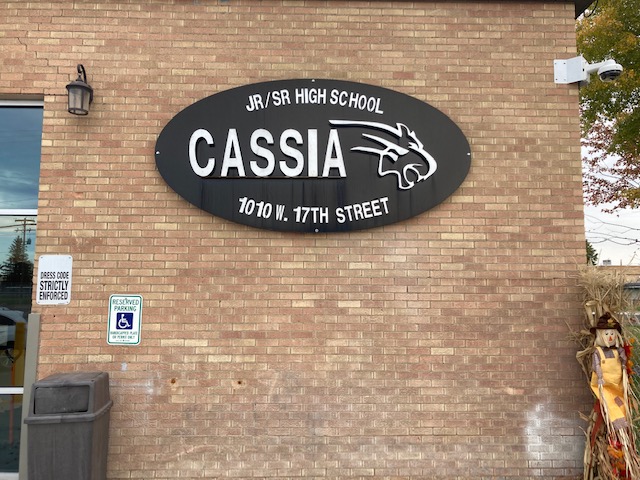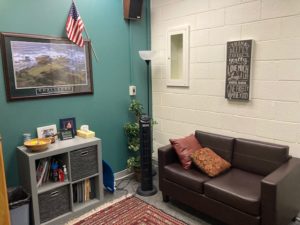
‘This is truly a fantastic partnership with long-lasting effects’
Licensed Clinical Social Worker Mathew Bowden is a firm believer that school-based behavioral health services are an effective way to get children the care they need.

He moved from Utah to Idaho to work for Magic Valley-based Family Health Services, which supplies behavioral health professionals to several area schools. Bowden provides counseling for students at three Cassia County School District campuses. He had previous experience with school-based behavioral health services in Ogden, Utah.
“The school-based behavioral health program is a great vision of what we want mental health to look like for our children and teenagers,” Bowden said. “In outpatient counseling, there aren’t many other types of setups that provide this quality of care.”
Bowden said the ability to collaborate with teachers, principals, counselors and parents to help support students is a big reason why he’s an advocate for school-based services.
“We provide support for the challenges that students are facing inside and outside of the classroom,” he said. “As we work together as a team, we can provide that kind of support that we hope all our students will get in the school environment when they are struggling.”
The Cassia County School District began offering School-Based Behavioral Health Services in 2019 after receiving a technical assistance award from the Blue Cross of Idaho Foundation for Health. The award allowed the district to implement the Healthy Minds Partnership, which is a collaboration between schools and behavioral health providers to offer services to children at school. The Foundation has directly helped 18 schools launch school-based behavioral health services. Many of those schools have worked with others within their district to expand the partnership to provide greater access to behavioral health services.
TECHNICAL ASSISTANCE AWARDS AVAILABLE
The Foundation is launching another round of technical assistance awards to help schools and school districts launch school-based behavioral health services.
School-based behavioral health services increase student access to care and eliminate barriers such as transportation concerns, parents having to miss work to take their kids to appointments and cost. The services are reimbursable by private insurance and Medicaid, meaning there is no cost to schools other than to provide a space for the services.
This collaboration also makes sense for healthcare providers such as Family Health Services, which doesn’t need to rent a building, pay utilities and other overhead costs. It’s a win-win scenario for students, schools and providers. After noticing the difference this program made in Cassia County Schools, Family Health Services expanded its reach to include Twin Falls, Kimberly and Shoshone schools. Buhl and Jerome also will offer services on school campuses.

“This is truly a fantastic partnership with long-lasting effects,” Family Health Services CEO Aaron Houston said. “I really think we’re going to help thousands of kids and hope that we’re still doing this 20-plus years from now. I think it’s a sustainable partnership.”
It’s also an important partnership.
Bowden believes he’s impacted the kids he works with, particularly helping students make the changes that they want to make in themselves. Those include reducing suicide attempts.
HELPING KIDS
“Some students have been struggling with self-harm behavior, including suicidal thoughts,” Bowden said. “In conjunction with the school counselor,and parents, we come up with a plan to help students find alternative ways to dealing with these feelings and negative thoughts.”
That might include connecting with student clubs, sports teams, and other community resources.
“We all come together to focus on what the student wants to be involved with and try to support them in making it happen,” he said.

Family Health Services works with other community resources to try and meet the needs of the families of the students. Students can struggle with other significant challenges such as moving to a new place, dealing with their own grief, divorce of parents, abuse, bullying, depression, and many others.
“The family is a key partner in making this program work,” Bowden said. “You have sessions with those youth and their families to work out what’s happening at home and may be leading to behaviors at school. The goal is that we see improvement in grades, behavior and attendance at school, and an improvement at home.”
A PART OF THE TEAM
School-based behavioral health programs work best when the onsite professional is viewed as part of the school team, rather than an outsider. This reduces the stigma to students who seek care and helps treat students effectively.
“I appreciate how welcoming the schools have been to me,” Bowden said. “They allow me to socialize with staff during lunch and at faculty parties. They invite me to be part of the overall school’s mental health program, Sources of Strength.”
Bowden said he would recommend any school to pursue a bringing school-based behavioral health program to its campus.
“We’re supporting good mental health and participating in the overall school environment,” Bowden said. “It’s all part of that collaborative atmosphere and support and care for students who need it. We really can provide the support for what I think every Idaho school district would be looking for their students. I would encourage any school, district or agency to look into school-based behavioral health services and ask, ‘how can we make this work?’”
